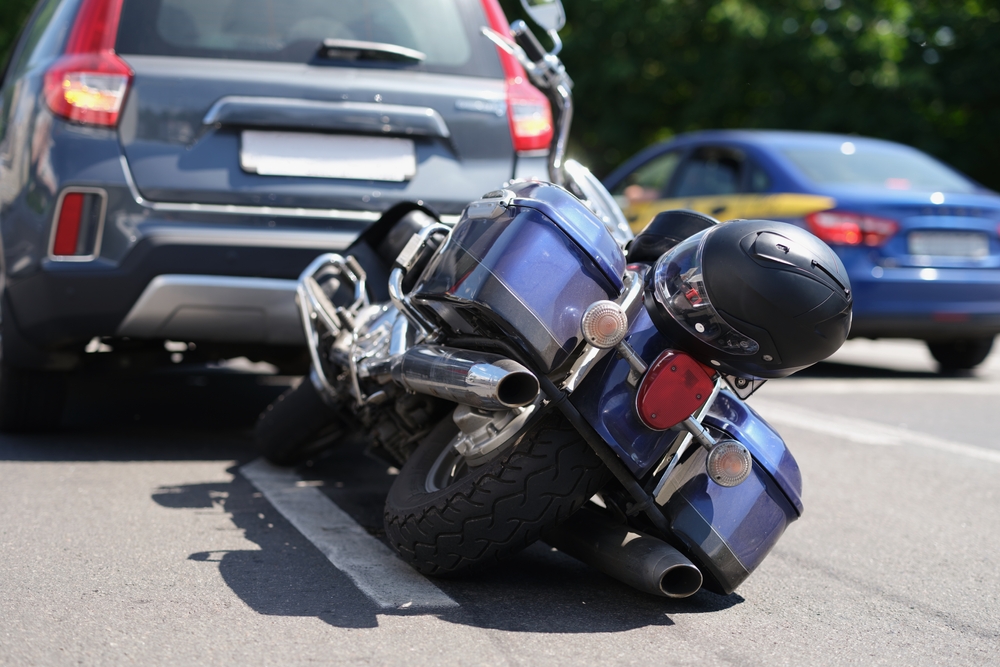Suppose you or someone close to you were recently in a motorcycle accident. In that case, you might wonder what the average payout for a motorcycle accident is. This is a common question as people in your position are often facing unpaid time off of work and mounting medical bills thanks to their accident.
Unfortunately, it can be very difficult to determine what an average payout is or even what your payout will be. Many factors come into play regarding the value of a motorcycle injury claim.
However, when you hire an experienced Vero Beach motorcycle accident lawyer, they can assess the circumstances surrounding your accident to provide you with an estimate of your claim’s value. They can also maximize your compensation in many ways.
Schedule A Consultation Today!
Potential Compensation Categories in Motorcycle Accident Claims

In the aftermath of a motorcycle accident, potential damages include a range of losses and injuries suffered by the victim based on the extent of harm and its impact on the victim's life.
Recognizing the different types of potential damages becomes pivotal when pursuing compensation. The primary categories of possible damages in a motorcycle accident include:
Economic Damages
- Medical expenses: All costs related to medical care, from ambulance fees and emergency services to hospitalization, surgeries, medications, rehabilitation, physical therapy, and future medical expenses if ongoing care is required, are covered damages in an injury claim.
- Property damage: Covering the expenses for repairing or replacing the damaged motorcycle and any other property, such as helmets or riding gear, affected in the accident.
- Lost income: Compensation for income lost during the recovery time when the victim can't work due to accident-related injuries. It may also account for lost earning capacity if injuries lead to a long-term or permanent disability impacting the victim's employability.
- Loss of employment benefits: If the motorcycle accident results in job loss or the forfeiture of employment benefits, compensation may be available for the value of those benefits.
Non-Economic Damages
- Pain and suffering: Financial recovery for physical pain, emotional distress, and mental anguish stemming from the accident and its resultant injuries. The evaluation of pain and suffering is subjective, contingent on the severity of injuries and their impact on the victim's life.
- Emotional distress: In instances of particularly traumatic accidents, victims might pursue compensation to address emotional trauma, including anxiety, depression, and post-traumatic stress disorder (PTSD).
- Loss of consortium: If the motorcycle accident disrupts the victim's relationship with their spouse, the spouse may be entitled to damages for the loss of companionship, affection, and support.
- Loss of enjoyment of life: Financial recovery for the decreased or lost ability to engage in activities or hobbies previously enjoyed by the victim due to their accident-induced injuries.
The Difficulty in Establishing Non-Economic Damages
Proving general damages (non-economic) poses a distinct challenge compared to demonstrating special damages (such as medical bills, lost income, and property damage) due to the absence of concrete evidence confirming their existence.
Insurance companies often approach general damages with skepticism, given the lack of a precise method for quantifying an individual's distress or suffering.
Despite the inherent difficulty, general damages are integral to a motorcycle accident injury claim, carrying potential long-term impacts that can be more enduring and challenging for victims to cope with than special damages.
Compiling evidence to support your general damages may involve testimony from various sources, including yourself, your treating physician, a mental healthcare provider, and friends or family acquainted with you before the accident.
Depending on the nature of the general damages, your medical records can also serve as valuable evidence. In addition, your attorney may reference similar cases as benchmarks, aiding in the pursuit of fair compensation for general damages.
Presenting the compensation received by victims of comparable accidents and injuries for their general damages can establish a foundation for negotiation when dealing with an insurance adjuster, potentially facilitating a more equitable settlement.
Punitive Damages
Suppose your motorcycle accident case ends up at trial, and the judge or the jury finds the actions of the at-fault party to be particularly reckless, malicious, or intentional.
In that case, they may opt to grant punitive damages. Set apart from economic and non-economic damages, punitive damages punish the liable party and deter similar behaviors in the future. However, punitive damages only apply if a case proceeds to court, and even then, they only apply in certain instances.
The types and amounts of potential damages can vary depending on the jurisdiction and the circumstances surrounding the accident. Additionally, specific states may impose caps on certain damages, including non-economic or punitive damages.
To ensure a fair assessment of your losses and the pursuit of rightful compensation, speak with a motorcycle accident lawyer immediately after an accident.
A qualified attorney can evaluate the particulars of your case, including who is liable for your damages, determine the complete extent of damages, and staunchly advocate for your rights throughout the legal proceedings.
What Happens to Your Damaged Motorcycle Following an Accident?
Following a motorcycle accident, the destiny of a damaged bike depends on the insurance provider rather than the owner. The insurer must determine whether repairing the motorcycle is financially viable or compensating the owner for its fair market value makes more financial sense. This process can make motorcyclists feel dissatisfied that they might not receive sufficient compensation for their losses.
If the insurance company determines that the repair costs exceed the motorcycle's actual cash value, they may choose to reimburse the owner for the damaged bike.

Essentially, this results in the insurer taking ownership of the motorcycle, with the owner having the option to retain it by obtaining a salvage title and compensating the insurer for its salvage value.
Depending on your state, some insurance companies have an automatic total loss threshold when appraised damages reach 80 percent of the motorcycle's actual cash value, classifying it as totaled. As repairs begin, unforeseen hidden damages may surface, potentially escalating repair costs beyond the actual cash value.
While the expenses for repairing or replacing your motorcycle may not be as substantial as your medical bills, these costs should still factor into the overall assessment of your claim. By enlisting the services of an attorney, they can ensure to account for these costs in your demand for damages.
Factors Affecting Compensation in Motorcycle Accident Cases
Determining the potential worth of a motorcycle accident case proves challenging, as each carries distinct factors influencing its value and resolution. Several key elements contribute to the final outcome, whether the case settles out of court or progresses to trial. Here are some influential factors:
Injury Severity
The foremost determinant of a motorcycle accident payout is the gravity of the rider's injuries. Severe outcomes, such as spinal cord damage, traumatic brain injuries (TBI), or limb loss, may result in higher compensation due to their lasting impact on the victim's life, quality of life, and long-term employability.
Medical Expenses
The cost of medical treatment significantly shapes the compensation amount. Expenses related to hospitalization, surgeries, physical therapy, and ongoing medical care contribute to the overall claim, especially when extensive rehabilitation or specialized treatment is necessary.
Property Damage
Motorcycle collisions often lead to substantial damage to the bike itself. The expenses for repairing or replacing the motorcycle, along with potential losses like helmets, jewelry, or protective footwear, can be included in the compensation claim.
Lost Wages and Income
Extended incapacity to work following an accident may entitle the rider to compensation for lost income. This includes both immediate income loss and the potential diminishment of future earning capacity, mainly if the injuries result in long-term or permanent disability.
Compensation for time missed at work for medical or rehabilitation appointments is also a consideration.
Pain and Suffering
Evaluating non-economic damages, such as pain and suffering, involves subjective considerations. Elements considered for this type of compensation include physical pain, emotional distress, loss of enjoyment of life, and the impact on personal relationships.
Insurance Coverage
The insurance policies covering involved parties play a pivotal role. Limited coverage from the at-fault party may restrict compensation availability.
When medical bills surpass the at-fault party's coverage, reliance on the injured party's insurance coverage, such as uninsured/underinsured motorist coverage, becomes crucial to bridge the financial gap.
Legal Representation
The quality of legal representation significantly influences the final payout amount. Competent motorcycle accident attorneys bring knowledge and skills to navigate legal complexities, negotiate with insurance companies, and safeguard the victim's rights throughout the process.
How You Can Maximize Your Motorcycle Accident Compensation
Despite lacking control over many or all of the circumstances leading to your motorcycle accident, there are proactive measures you can take to potentially increase your compensation. Here are several essential tips to maximize your compensation after a motorcycle accident:
Seek Immediate Medical Attention

- Prioritize your health by promptly seeking medical attention, even if injuries appear minor.
- Immediate evaluation helps document all injuries, especially those not immediately apparent.
- Medical records serve as crucial evidence in your compensation claim.
Always Follow Your Doctor's Advice
- Adhere to your doctor's directions and treatment plan, demonstrating a commitment to recovery.
- Compliance signals the seriousness of your injuries, countering potential skepticism from insurance adjusters.
Preserve Evidence
- Capture evidence after leaving the accident scene, including photos of motorcycle damage, personal belongings, and visible injuries.
- Obtain the police report for essential incident details, including witness information.
Report the Accident
- Notify your insurance company promptly, ensuring you provide accurate information.
- Exercise caution when speaking with the at-fault party's insurance adjuster, avoiding any admissions of fault in their eyes—including apologizing for the accident.
Consult with an Experienced Motorcycle Accident Attorney
- Engage a seasoned attorney to navigate personal injury laws, communicate with insurance companies, gather evidence, and negotiate on your behalf.
- Protect your rights and ensure full and fair compensation for your losses.
Document Your Damages
- Maintain detailed records and receipts for all accident-related expenses, including medical bills, medication costs, travel expenses, and other incurred costs.
- Document missed workdays and potential future income impact.
Exercise Caution with Insurance Adjusters
- Be cautious when communicating with the at-fault party's insurance adjusters.
- Refrain from providing recorded statements without consulting your own attorney first.
Avoid Quick Settlement Offers
- Resist accepting early settlement offers, as initial amounts are often lower than deserved.
- Consult with your attorney to evaluate the full extent of damages before accepting any settlement.
Consider Long-Term Implications:
- Factor in potential long-term effects on health and quality of life when seeking compensation.
- Delay settling your claim until you have a full understanding of the complete impact of injuries on your life.
Be Patient and Persistent
- Understand that securing fair compensation may take time, especially if the case proceeds to court.
- Trust your motorcycle accident attorney to work diligently on your behalf and address any concerns or questions you may have.
By following these guidelines and collaborating with an experienced motorcycle accident lawyer, you can navigate the complexities of the personal injury legal process, safeguard your rights, and secure the deserved payout for your losses, allowing you to focus on recovery and well-being.
Were You Recently in a Motorcycle Accident? Consult an Experienced Attorney Now to Determine the Potential Value of Your Case

Determining the payout for a motorcycle crash involves considering numerous factors. Since all cases are unique, there really is no average payout amount.
Each case is distinct, and the compensation is contingent on factors such as the severity of injuries, medical expenses, property damage, lost income, pain and suffering, and other pertinent elements.
If you've suffered injuries in a crash, always seek the guidance of an experienced motorcycle accident attorney. They can assess your case, safeguard your rights, and pursue full and fair compensation for your losses. The sooner you contact an attorney after your motorcycle accident, the more they can help maximize your claim's value.
You pay nothing for a consultation with a trusted attorney, who can advise of your rights and what your case might be worth. Once you have legal representation, you do not have to wonder about your future.
